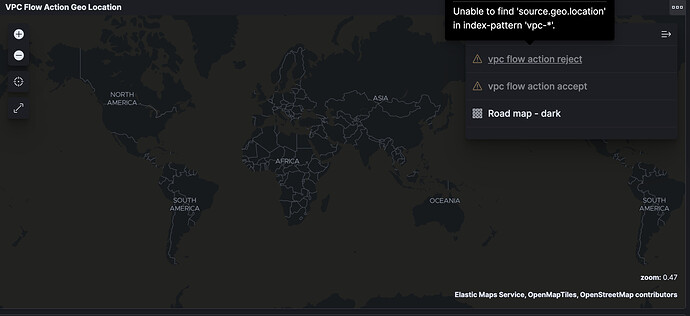I would like to convert the following to a geo_point type
"location": {
"properties": {
"lat": {
"type": "float"
},
"lon": {
"type": "float"
}
}
}
The issue that I am running into is that the field source.geo.location is not of type geo_point. I would like to modify the location mapping to look like this
"location": {
"type": "geo_point"
"properties": {
"lat": {
"type": "float"
},
"lon": {
"type": "float"
}
}
I have reviewed this issue here: Unable to find source.geo.location in index pattern logstash-*, but it doesn't answer my question. I am using the preconfigured elastic common schema from the aws module. This particular issue is related to the vpc flow logs visualization. I have attached a screen shot for extra clarity.
My attempt at fixing the problem
PUT /vpc-7.10.2-2021.03.05/_mapping
{
"mappings" : {
"properties": {
"source.geo.location": {
"type": "geo_point"
}
}
}
}
this just produced
{
"error" : {
"root_cause" : [
{
"type" : "mapper_parsing_exception",
"reason" : "Root mapping definition has unsupported parameters: [mappings : {properties={source.geo.location={type=geo_point}}}]"
}
],
"type" : "mapper_parsing_exception",
"reason" : "Root mapping definition has unsupported parameters: [mappings : {properties={source.geo.location={type=geo_point}}}]"
},
"status" : 400
}
This doesn't work either
PUT /vpc-7.10.2-2021.03.05/_mapping
{
"mappings" : {
"properties": {
"location": {
"type": "geo_point"
}
}
}
}
This does not help either
PUT /vpc-7.10.2-2021.03.05/_mapping
{
"properties": {
"location": {
"type": "geo_point"
}
}
}
This one doesn't do it either
PUT /vpc-*/_mapping
{
"source": {
"geo":{
"location":{
"properties":{
"type": "geo_point"
}
}
}
}
}

